
Internet service providers in Kenya have revolutionized how Kenyans connect, work, and communicate in the digital age. Whether you’re a business owner seeking reliable connectivity or a household looking for affordable internet solutions, choosing the right provider can make all the difference. This comprehensive guide explores the top 10 Internet Service Providers in Kenya, backed by official data from the Communication Authority of Kenya.
The Kenyan internet landscape has grown tremendously, with over 2.1 million fixed data subscriptions across various technologies. From fiber-to-the-home (FTTH) connections to wireless internet providers in Kenya, the market offers diverse solutions for every need and budget.
Top Internet Service Providers in Kenya
- Safaricom PLC – 34.3% market share, leading mobile and fixed internet provider
- Jamii Telecommunications – 20.6% market share, strong fiber network coverage
- Wananchi Group – 12.7% market share, popular for home internet solutions
- Poa Internet Kenya – 12.5% market share, affordable community-focused services
- Ahadi Wireless – 7.5% market share, emerging wireless internet solutions
Understanding Kenya’s Internet Market
Kenya’s internet infrastructure has experienced remarkable growth over the past decade. The market has evolved dramatically, with established wireless internet providers in Kenya facing new competition. This has led to better speeds and more competitive pricing for everyone.
The Communication Authority of Kenya reports significant improvements in coverage, speeds, and affordability across the country. Fixed data subscribers primarily choose speeds between 10 Mbps and 30 Mbps, indicating a preference for reliable mid-range connectivity.
The market demonstrates healthy competition among internet service providers in Kenya, with established telecommunications companies competing alongside innovative startups. This competition benefits consumers through improved services, competitive pricing, and expanded coverage areas.
Technology adoption varies across different segments. Fiber-to-the-home (FTTH) leads with over 1.1 million subscriptions, while fixed wireless internet serves over 721,000 customers. Satellite internet, though smaller, provides crucial connectivity in remote areas where traditional infrastructure faces challenges.
Top 10 Internet Service Providers in Kenya: Analysis
1. Safaricom PLC – The Market Leader
Market Share: 34.3% | Subscribers: 735,749
Safaricom PLC dominates Kenya’s internet landscape, maintaining its position as the leading provider among Internet Service Providers in Kenya. The company leverages its extensive mobile network infrastructure to offer comprehensive internet solutions across the country.
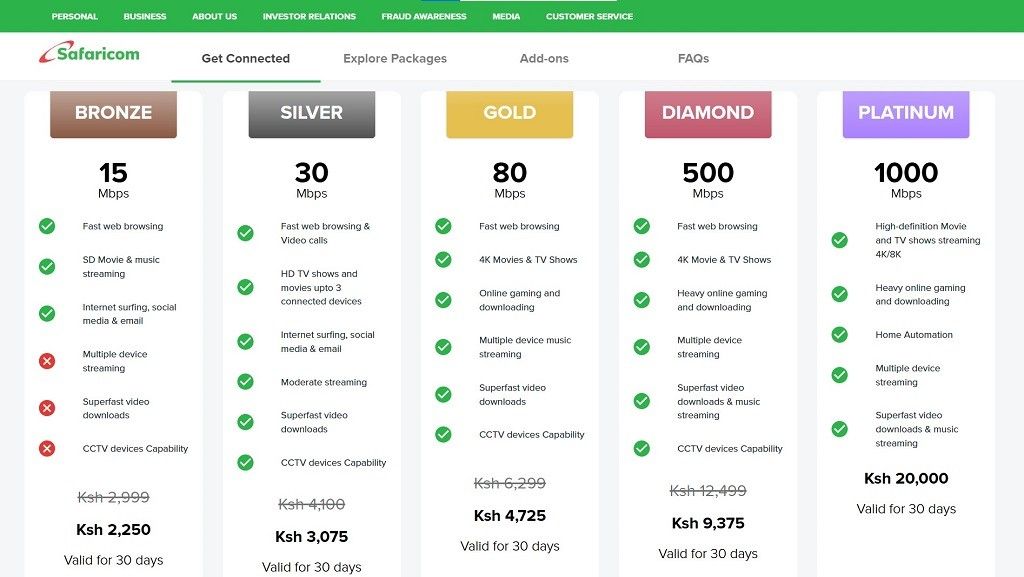
Key Strengths:
- Nationwide coverage with robust infrastructure
- Integrated mobile and fixed internet services
- Strong customer support network
- Multiple payment options, including mobile money
Service Offerings: Safaricom provides various internet packages, from basic home connections to enterprise-grade solutions. Their fiber network reaches major urban centers, while their 4G and 5G networks extend connectivity to rural areas. The company’s strength lies in its ability to bundle mobile, internet, and digital services seamlessly.
Target Market: Safaricom serves all segments, from individual consumers to large enterprises. Their diverse portfolio makes them suitable for households, small businesses, and corporations requiring reliable connectivity. Its Fibre-to-the-Home (FTTH) and Fibre-to-the-Office (FTTO) packages offer fast speeds for households and businesses alike.
- Technology: Fiber Optic, 3G/4G/5G Wireless
- Coverage: Nationwide, with the most extensive infrastructure among wireless internet providers in Kenya.
- Best For: Users prioritizing guaranteed uptime, low latency for gaming, and widespread coverage.
Home Fiber Packages (Monthly):
- Bronze: 15 Mbps for KSh 2,999
- Silver: 30 Mbps for KSh 4,100
- Gold: 80 Mbps for KSh 6,299
- Diamond: 500 Mbps for KSh 12,499
- Platinum: 1 Gbps for KSh 20,000
Pros: Reliable connectivity, extensive urban and rural coverage, leading 5G innovation with router prices slashed to KSh 2,999.
Cons: Premium pricing compared to some competitors, and occasional network stability issues during major events.
2. Jamii Telecommunications Limited (JTL) – Faiba
Market Share: 20.6% | Subscribers: 442,076
Jamii Telecommunications has established itself as a formidable player among wireless internet providers in Kenya and fixed broadband services. The company focuses primarily on fiber optic infrastructure, delivering high-speed internet across major urban areas.
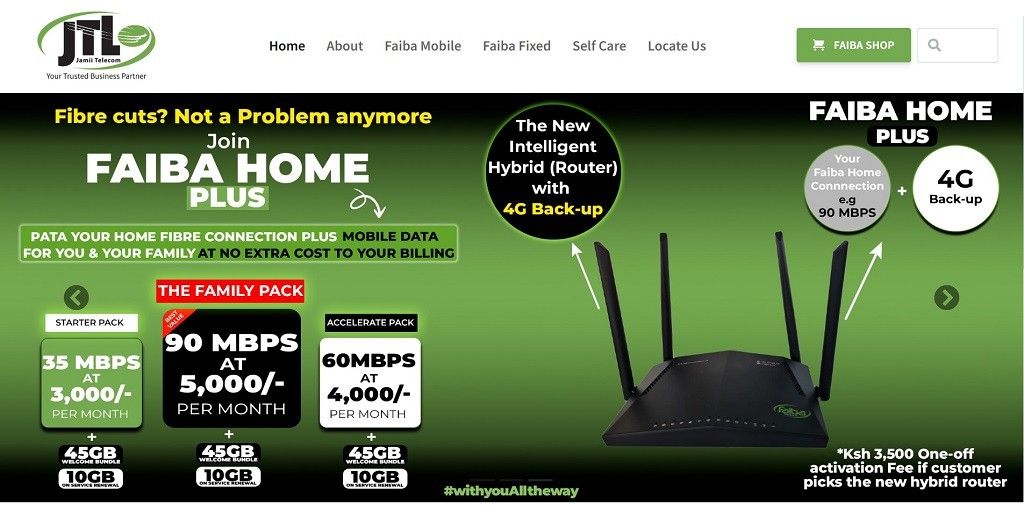
Key Strengths:
- Extensive fiber network coverage
- Competitive pricing for high-speed packages
- Strong focus on customer experience
- Reliable service quality
Service Offerings: Jamii specializes in fiber-to-the-home and fiber-to-the-business solutions. Their packages cater to users requiring consistent high-speed internet, from streaming enthusiasts to businesses running cloud applications. The company has invested heavily in network redundancy, ensuring minimal downtime.
Target Market: Jamii primarily targets urban households and businesses requiring high-speed internet. Their services appeal to tech-savvy consumers who prioritize speed and reliability over cost.
- Technology: Fiber Optic, 4G
- Coverage: Major urban centers, with growing reach.
- Best For: Heavy users needing consistent speeds with no data caps.
Home Fiber Packages (Monthly)
- 70 Mbps – KSh 5,000
- 90 Mbps – KSh 10,000
- 120 Mbps – KSh 15,000
- 300 Mbps – KSh 20,000
Pros: Competitive pricing, high-speed performance, and truly unlimited data with no FUP on many plans.
Cons: Coverage is primarily focused on urban areas, limiting availability in remote locations
3. Wananchi Group (Zuku) – Affordable Home Internet
Market Share: 12.7% | Subscribers: 271,822
Wananchi Group operates under the Zuku brand, positioning itself uniquely among Internet Service Providers in Kenya by combining internet services with entertainment content. This integrated approach has attracted a loyal customer base seeking comprehensive digital solutions.
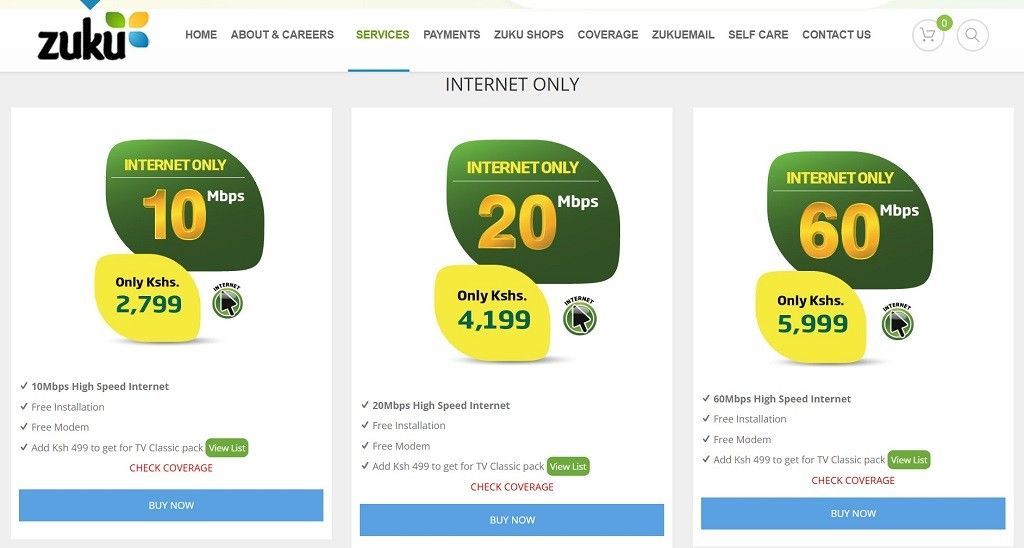
Key Strengths:
- Integrated internet and entertainment packages
- Competitive pricing for bundled services
- Strong brand recognition
- Comprehensive customer support
Service Offerings: Wananchi offers internet packages bundled with digital TV services, making them attractive to households seeking entertainment and connectivity. Their fiber network covers major residential areas, while their cable infrastructure provides reliable connections in established neighborhoods.
Target Market: The company primarily targets households and entertainment-focused consumers. Families seeking both internet connectivity and premium television content find Wananchi’s offerings particularly appealing.
- Technology: Fiber Optic, Cable
- Coverage: Nairobi, Mombasa, Kisumu, Nakuru.
- Best For: Households seeking affordable TV and internet bundles.
Internet-Only Packages (Monthly):
- 10 Mbps – KSh 2,799
- 20 Mbps – KSh 4,199
- 60 Mbps – KSh 5,999
Pros: Very affordable bundle options, making it one of the cheapest home WiFi choices for families.
Cons: Coverage is limited to major towns, and some users report service inconsistency
4. Poa Internet Kenya Ltd – The Community-Centered Provider
Market Share: 12.5% | Subscribers: 268,554
Poa Internet has gained recognition as one of the best internet providers Kenya offers for community-focused solutions. The company’s approach emphasizes affordable, reliable internet access for underserved communities and cost-conscious consumers.
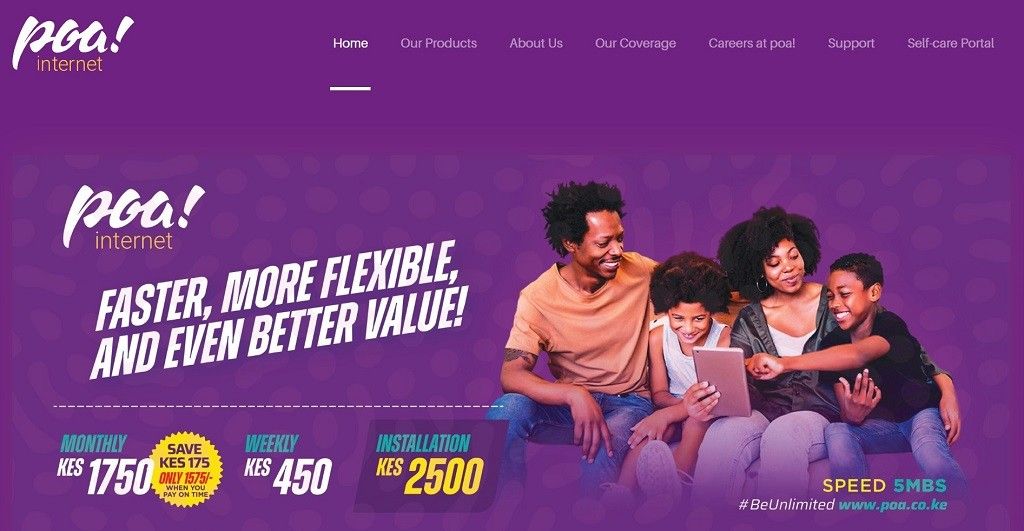
Key Strengths:
- Affordable pricing models
- Community-centered approach
- Growing network coverage
- Simplified service packages
Service Offerings: Poa Internet focuses on providing affordable internet solutions without compromising on quality. Their network combines fiber and wireless technologies to reach areas where traditional providers might not offer cost-effective solutions. The company’s packages target price-sensitive consumers seeking reliable connectivity.
Target Market: Poa primarily serves budget-conscious households and small businesses in emerging neighborhoods. Their community-focused approach appeals to areas seeking reliable yet affordable internet solutions.
- Technology: Wireless
- Coverage: Nairobi, Eldoret, Nakuru, Kisumu, and Mombasa (specific estates).
- Best For: Underserved communities needing basic, affordable access.
Package
- 5 Mbps (capped) – KSh 1,575 per month or KSh 450 per week.
Pros: Extremely affordable, focusing on communities other providers ignore.
Cons: Speed is capped at 5 Mbps, which is low for heavy usage, and there is a KSh 2,000 installation fee
5. Ahadi Wireless Limited – The Rising Star
Market Share: 7.5% | Subscribers: 160,254
Ahadi Wireless represents the new generation of wireless internet providers in Kenya, demonstrating impressive growth by joining the top ten Internet Service Providers in Kenya. This relatively new entrant has quickly gained market share through innovative wireless solutions.
Key Strengths:
- Rapid network expansion
- Innovative wireless technologies
- Competitive pricing
- Agile service deployment
Service Offerings: Ahadi Wireless leverages advanced wireless technologies to provide internet services across various environments. Their solutions include fixed wireless access for homes and businesses, with particular strength in areas where fiber deployment faces challenges.
Target Market: The company targets areas underserved by traditional fiber networks and customers seeking flexible wireless internet solutions. Their services appeal to both residential and commercial users requiring quick deployment and reliable connectivity.
6. Vilcom Network Limited – Reliable Corporate Solutions
Market Share: 4.1% | Subscribers: 87,654
Vilcom Network focuses on specialized internet solutions, carving out a niche among Internet Service Providers in Kenya through targeted service offerings and technical expertise.
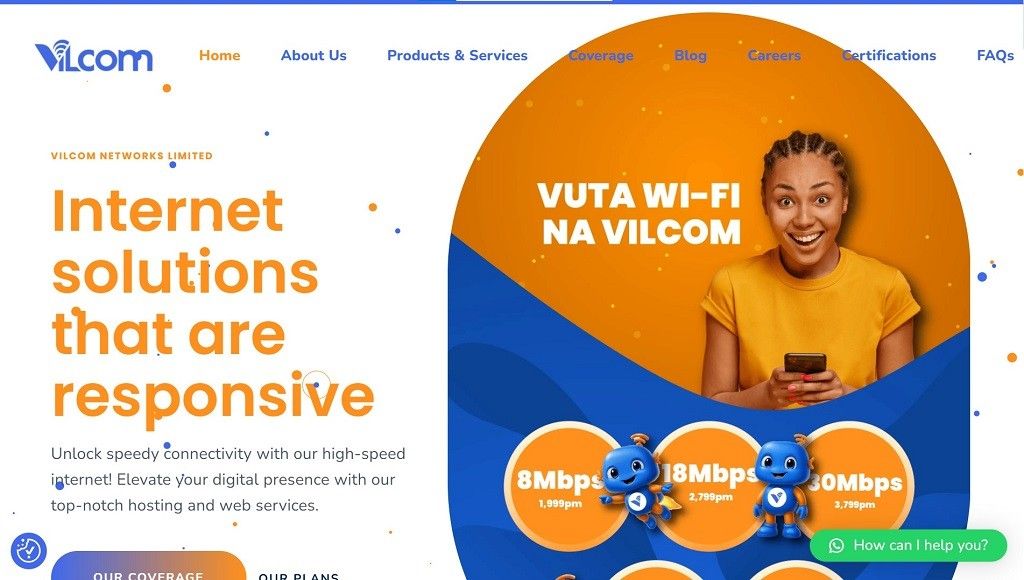
Key Strengths:
- Specialized technical solutions
- Customized service packages
- Strong technical support
- Niche market focus
Service Offerings: Vilcom provides tailored internet solutions for specific industries and requirements. Their services often include customized packages for businesses with unique connectivity needs, emphasizing quality over quantity in their customer base.
Target Market: The company primarily serves businesses and organizations requiring specialized internet solutions, including government entities, educational institutions, and enterprises with specific technical requirements.
- Technology: Fiber Optic
- Coverage: 20 counties including Nairobi, Mombasa, Nakuru, and Kiambu.
- Best For: Users in covered areas looking for a balance of speed and price.
Home Packages (Monthly):
- Starter: 8 Mbps for KSh 1,999
- Basic: 30 Mbps for KSh 3,799
- Standard: 100 Mbps for KSh 7,999
- Premium: 500 Mbps for KSh 11,999
Pros: Competitive pricing for high-speed plans, and expanding coverage.
Cons: Still a relatively new player compared to established giants.
7. Mawingu Networks Ltd – Rural Internet Champion
Market Share: 3.6% | Subscribers: 76,650
Mawingu Networks has established itself among the best internet providers Kenya offers for rural and underserved areas, focusing on extending internet access beyond urban centers.

Key Strengths:
- Rural area coverage
- Innovative deployment strategies
- Community-focused approach
- Affordable pricing for remote areas
Service Offerings: Mawingu specializes in bringing internet connectivity to areas traditional providers might overlook. Their solutions combine various technologies to ensure reliable service in challenging geographical locations.
Target Market: The company primarily serves rural communities, small towns, and areas where major providers have limited presence. Their services appeal to customers seeking reliable internet access in previously underserved locations.
- Technology: Fixed Wireless
- Coverage: 30 counties, focusing on rural communities.
- Best For: Rural households and businesses where fiber is unavailable.
Home Packages (Monthly):
- 10 Mbps – KSh 2,500
- 15 Mbps – KSh 3,000
- 20 Mbps – KSh 4,500
Pros: Fills a critical gap in rural connectivity and affordable plans.
Cons: Requires a KSh 3,000 refundable deposit
8. Dimension Data Solutions East Africa Limited – Premium Enterprise Internet
Market Share: 0.9% | Subscribers: 19,388
Dimension Data focuses on enterprise-level solutions, positioning itself among Internet Service Providers in Kenya as a specialist in business connectivity and IT services.
Key Strengths:
- Enterprise-grade solutions
- Comprehensive IT services
- High-level technical support
- Customized business packages
Service Offerings: The company provides sophisticated internet and IT solutions for large organizations, including managed services, cloud connectivity, and enterprise networking solutions.
Target Market: Dimension Data primarily serves large enterprises, multinational corporations, and organizations requiring comprehensive IT infrastructure and support.
- Technology: Fiber Optic
- Coverage: Information not specified in search results.
- Best For: Users who want truly unlimited internet without potential throttling.
Home Packages (Monthly):
- Silver: 6 Mbps for KSh 2,900
- Gold: 12 Mbps for KSh 3,900
- Platinum: 24 Mbps for KSh 5,800
Pros: No FUP or data caps.
Cons: Speeds are generally lower than other fiber providers.
9. Starlink Internet Services Kenya – Satellite Connectivity
Market Share: 0.8% | Subscribers: 17,425
Starlink represents cutting-edge satellite technology among wireless internet providers in Kenya, offering innovative solutions for areas where traditional infrastructure faces limitations.

Key Strengths:
- Satellite-based coverage
- High-speed capabilities
- Geographic flexibility
- Advanced technology platform
Service Offerings: Starlink provides satellite internet services capable of reaching virtually any location in Kenya, offering high-speed connectivity through low Earth orbit satellites.
Target Market: The service appeals to remote locations, businesses requiring backup connectivity, and users in areas where terrestrial internet infrastructure is limited or unreliable.
- Technology: Low Earth Orbit (LEO) Satellite
- Coverage: Nationwide, including the most remote areas.
- Best For: Remote areas where fiber cables cannot reach.
Package:
- Basic unlimited plan: Approximately KSh 4,000 per month.
Pros: Revolutionary coverage for remote locations.
Cons: High upfront equipment cost, latency (20-40ms) is higher than fiber, and usage saw a recent decline
10. Liquid Telecommunications Kenya – The Regional Network Provider
Market Share: 0.8% | Subscribers: 16,366
Liquid Telecommunications brings regional expertise to Kenya’s internet market, leveraging extensive African network infrastructure to provide reliable connectivity solutions.
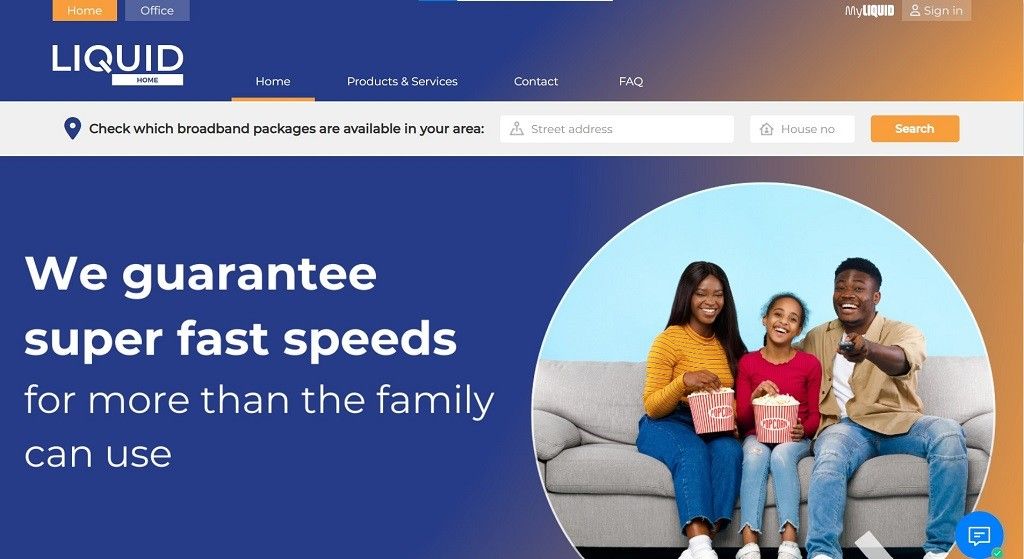
Key Strengths:
- Regional network backbone
- Enterprise focus
- Technical expertise
- International connectivity
Service Offerings: Liquid provides enterprise-grade internet services with emphasis on businesses requiring international connectivity and regional network access.
Target Market: The company primarily serves businesses with regional operations, organizations requiring international connectivity, and enterprises needing specialized network services.
- Technology: Fiber Optic
- Coverage: Urban business districts and select homes.
- Best For: Businesses and power users requiring enterprise-grade reliability.
Home Packages (Monthly):
- Fast: 20 Mbps for KSh 2,799
- Super Fast: 60 Mbps for KSh 4,449
- Turbo Charged: 100 Mbps for KSh 11,999
Pros: Enterprise-grade network reliability and support.
Cons: Pricing and focus are more geared towards businesses.
Internet Speed Preferences and Technology Adoption in Kenya
Understanding internet speed preferences helps consumers choose among Internet Service Providers in Kenya based on their specific needs. According to Communication Authority data, most subscribers prefer speeds between 10 Mbps and 30 Mbps, indicating a preference for reliable mid-range connectivity suitable for streaming, remote work, and general internet usage.
Speed Distribution Analysis:
- 10-30 Mbps: Most popular choice for households and small businesses
- 2-10 Mbps: Suitable for basic internet needs and budget-conscious users
- 30-100 Mbps: Preferred by power users and medium businesses
- Above 1 Gbps: Enterprise-level connections for large organizations
Technology Preferences: Fiber-to-the-home (FTTH) dominates with over 1.1 million subscriptions, demonstrating consumer preference for reliable, high-speed connections. Fixed wireless serves over 721,000 customers, particularly in areas where fiber deployment faces challenges. Cable modem technology serves nearly 200,000 subscribers, while satellite internet provides crucial connectivity for remote locations.
Factors to Consider When Choosing Internet Service Providers in Kenya
Coverage and Availability
Before selecting among the best internet providers Kenya offers, verify service availability in your area. Urban areas typically enjoy multiple options, while rural locations might have limited choices. Contact providers directly to confirm coverage and installation possibilities.
Speed Requirements
Assess your internet usage patterns to determine appropriate speed requirements. Basic browsing and email require minimal bandwidth, while streaming, gaming, and remote work demand higher speeds. Consider future needs when selecting packages to avoid frequent upgrades.
Pricing and Value
Compare total costs including installation fees, monthly charges, and equipment costs. Many wireless internet providers in Kenya offer promotional rates that increase after initial periods. Calculate long-term costs to make informed decisions.
Customer Support Quality
Reliable customer support becomes crucial when technical issues arise. Research provider reputation for customer service, support availability, and problem resolution efficiency. Online reviews and recommendations provide valuable insights.
Technology and Reliability
Different technologies offer varying reliability levels. Fiber connections generally provide consistent speeds and minimal downtime, while wireless solutions offer flexibility but might experience weather-related interruptions. Consider your reliability requirements when choosing.
Future Trends in Kenya’s Internet Market
The landscape of internet service providers in Kenya is evolving rapidly. 5G technology deployment promises enhanced mobile internet experiences, while satellite internet expansion could revolutionize rural connectivity. Fiber network growth continues to expand high-speed access to previously underserved areas.
Competition among providers drives innovation in service delivery, pricing models, and customer experience. This competition benefits consumers through improved services, competitive pricing, and expanded coverage options.
Government initiatives supporting digital infrastructure development encourage further market growth and improved connectivity across the country. These efforts particularly benefit rural and underserved communities previously lacking reliable internet access.
Conclusion
Choosing among internet service providers in Kenya requires careful consideration of coverage, speed requirements, pricing, and service quality. The market offers diverse options from established leaders like Safaricom and Jamii Telecommunications to innovative newcomers like Ahadi Wireless and Starlink.
The data from the Communication Authority of Kenya reveals a healthy, competitive market with options for every need and budget. Whether you require basic connectivity for personal use or enterprise-grade solutions for business operations, Kenya’s internet market provides suitable choices.
As the digital economy continues growing, reliable internet connectivity becomes increasingly essential for personal, educational, and business success. By understanding available options and evaluating providers based on your specific requirements, you can select the ideal internet service to support your digital lifestyle and goals.
The wireless internet providers in Kenya and traditional fixed-line services continue expanding coverage and improving service quality. This ongoing development ensures that all Kenyans can access the connectivity they need to participate fully in the digital economy and global community.
